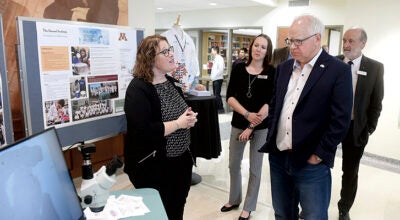Minnesota cities, counties to catch sales tax break
Published 9:30 am Monday, December 16, 2013
ST. PAUL — Minnesota city and county governments have a good reason to wait until after the holidays to do any major shopping: Starting Jan. 1, much of the stuff they buy will be tax-free.
As part of a budget deal in May, the Legislature exempted most local government purchases from the state’s 6.875 percent sales tax beginning in the new year, which collectively will save cities and counties tens of millions of dollars each year. The months of lead time caused some local leaders to postpone big equipment purchases or let supplies run lower than normal.
“We held off on those things that we reasonably could without negatively affecting our service delivery,” said St. Louis County Commissioner Steve Raukar.
Once the break kicks in, Raukar estimates that his county will save $1.3 million to $1.5 million a year. Officials there used to point out to citizens how much sales tax was included in major purchases, such as new squad cars for the sheriff’s department.
The state’s 87 counties and more than 850 cities paid an estimated $54 million in sales taxes in 2012, according to a report compiled by the League of Minnesota Cities, the Association of Minnesota Counties and the Minnesota Inter-County Association. A Department of Revenue projection puts the potential savings much higher — about $130 million in the first full year.
In Sauk Centre, west of St. Cloud, officials had been pricing out a new wood chipper and a lawnmower. City council members decided this fall to hold off on buying both — at a combined $60,000 — because they could save $4,000 in sales taxes a few months later.
Every bit adds up in a city with an annual budget of roughly $3 million, said Sauk Centre administrator Vicki Willer.
“It can be significant when you start looking at things all the way down from office supplies to salt, sand and equipment purchases,” Willer said of the savings, which helped city leaders keep the property tax levy flat for the coming year.
Gravel, road salt, paper clips, phone service, police accessories, lawn care and fire trucks are some of the things that will no longer be taxed.
The tax will still apply to items bought for public golf courses, marinas, liquor stores, fitness centers, campgrounds and other government-owned enterprises because they can compete directly with private businesses. Unmarked squad cars, electricity and candy are among things that also will remain taxed.
Minnesota hasn’t always compelled local governments to pay sales taxes. As they worked through a 1992 budget crunch, state lawmakers offered to avoid deep cuts to local government aid programs in exchange for making their purchases taxable. Local leaders figured it would be temporary. But it stuck around and their lobbying groups have had repeal on their wish list for years. Townships caught their break in 2011.





